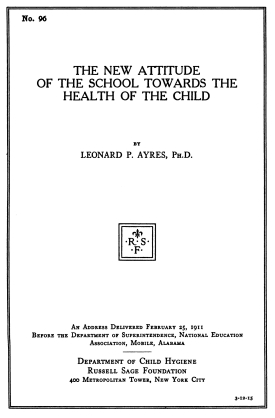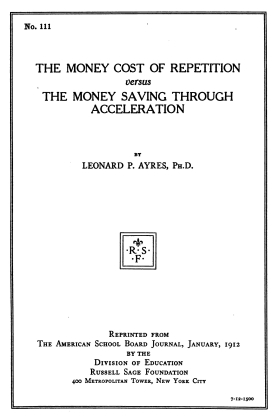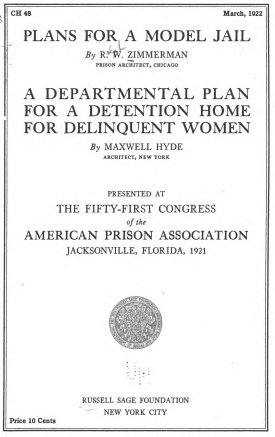About This Book
This pamphlet was released by the Russell Sage Foundation’s Committee of Education in 1925, detailing proper fireproof building materials and safety regulations to prevent fires in schools.
This pamphlet was released by the Russell Sage Foundation’s Committee of Education in 1925, detailing proper fireproof building materials and safety regulations to prevent fires in schools.
Prepared by the Child Hygiene Committee of the Russell Sage Foundation in 1913, “Dust and Disease” tackles the prevention of infectious diseases at schools. It specifically argues for daily school disinfection.
J. T. AINSLEE WALKER was fellow of the Royal Society of Medicine and fellow of the Chemical Society.
This 1909 paper traces data on Chicago’s South Park Playgrounds to argue that the presence of parks and playgrounds in a neighborhood correlates to a decrease in the number of cases of juvenile delinquency.
ALLEN BURNS, Department of Child Hygiene, Russell Sage Foundation

Delivered before the Department of Superintendence of the National Education Association in Mobile, Alabama, on February 25, 1911, this address details the rapid fundamental changes in school hygiene and children’s health in schools over the start of the twentieth century, including medical exams, dental inspections, and the rise of school nurses.
LEONARD P. AYRES was director of the Division of Education at the Russell Sage Foundation.

Based on an investigation conducted in 1911 by the Division of Education of the Russell Sage Foundation and the superintendents of schools of twenty-nine cities, this article examines the data behind how much American cities spend on public education and what they get for their money, shedding light on the relation between school expenditures and school results.
LEONARD P. AYRES was director of the Division of Education at the Russell Sage Foundation.
A preliminary report of an investigation made by the Division of Education of the Russell Sage Foundation and the superintendents of schools of twenty-nine cities in 1911, with the aim of determining the best methods of identifying and helping misfit children in the classroom.
LEONARD P. AYRES was director of the Division of Education at the Russell Sage Foundation.
A volume of the Topeka Improvement Survey, a survey of health conditions in Topeka, Kansas, in 1914, this report studies the labor conditions of the industrial trades found in Topeka, particularly the automotive industry. Published with A Public Health Survey of Topeka by Franz Schneider, Jr., Delinquency and Corrections by Zenas L. Potter, and Municipal Administration in Topeka by D. O. Decker.
ZENAS L. POTTER, Department of Surveys and Exhibits, Russell Sage Foundation
A volume of the Topeka Improvement Survey, a survey of health conditions in Topeka, Kansas, in 1914, this report centers on the administrative bodies of the city government, as well as the financial measures taken to fund these. Published with A Public Health Survey of Topeka by Franz Schneider, Jr., Delinquency and Corrections by Zenas L. Potter, and Industrial Conditions in Topeka by Zenas L. Potter.
D. O. DECKER was special agent of the Department of Surveys and Exhibits of the Russell Sage Foundation.
A volume of the Topeka Improvement Survey, a survey of health conditions in Topeka, Kansas, in 1914, this report examines the courts, police departments, and city and county jails. Juvenile delinquency and preventative work are explored. Published with A Public Health Survey of Topeka by Franz Schneider, Jr., Municipal Administration in Topeka by D. O. Decker, and Industrial Conditions in Topeka by Zenas L. Potter.
ZENAS L. POTTER, Department of Surveys and Exhibits, Russell Sage Foundation

Presented at the fifty-first congress of the American Prison Association in 1921, this pamphlet attempts to develop proper, universal plans for a detention home for women. Arguing that each prison would have specific building requirements and characteristics, the author presents several well-established canons of architecture and building which should be followed in any jail, emphasizing humane conditions and required needs. Printed with Plans for a Model Jail by R. W. Zimmerman.
MAXWELL HYDE, architect, New York